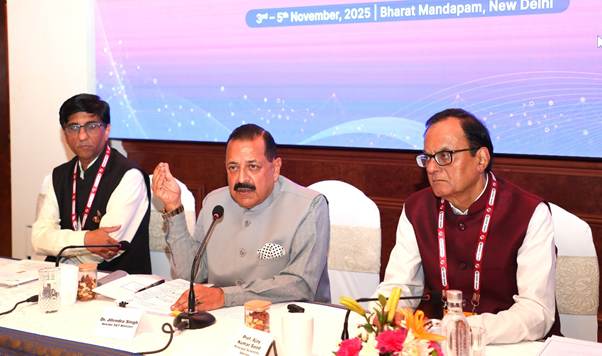Union Minister of State (Independent Charge) for Science and Technology, Dr Jitendra Singh, addressed a round table on “VAIBHAV Vision for Viksit Bharat” with eminent NRI scientists and scholars during the three-day Emerging Science, Technology and Innovation Conclave (ESTIC 2025).
Speaking at the event, Singh said, “You are not outsiders — you are part of the Indian scientific family.” The Minister emphasized that India’s engagement with its global scientific community must evolve from the earlier era of “brain drain” to a model of “reverse brain drain” or “brain exchange,” where knowledge, innovation, and ideas flow seamlessly between India and its diaspora.
The meeting was moderated by Principal Scientific Adviser to the Government, Professor Ajay Kumar Sood, while Secretary, Department of Science and Technology, Professor Abhay Karandikar, delivered the welcome address. VAIBHAV Fellows from countries including the United States, Canada, Sweden, and Australia participated in the discussion and shared practical suggestions to strengthen collaboration between Indian and international research institutions.
Participants praised the government’s efforts to institutionalize diaspora engagement through the VAIBHAV fellowship and proposed a more structured mechanism for student mobility to promote global exposure and joint research. They also recommended simplifying travel and conference clearance procedures for international scholars to enhance India’s global research participation.
Several scientists suggested extending the VAIBHAV fellowship from three to five years, noting that long-term collaboration is essential to achieve sustainable outcomes. Others highlighted the importance of developing “systems for India” — indigenous technological solutions designed for Indian needs in areas such as 5G, 6G, and advanced manufacturing.
Discussions also touched upon the potential for public–private and cross-border partnerships to translate research into industrial innovation. A participant from Sweden highlighted opportunities for collaboration that leverage underutilized research infrastructure in Europe with India’s growing scientific talent pool.
Responding to the participants’ ideas, Singh said the government would consider several of the practical proposals shared by the diaspora. He agreed that simplifying travel and approval frameworks for visiting international faculty would be a positive step and noted that the proposal for a prior-approved faculty list could be explored with the Ministry of External Affairs.
The Minister underlined India’s rising performance in research and innovation, noting that more than half of all patents filed in recent years have come from resident Indians. He cited achievements such as the development of the indigenous COVID-19 vaccine, gene therapy for haemophilia, the HPV vaccine, and landmark missions like Chandrayaan-3.
Reaffirming Prime Minister Narendra Modi’s consistent outreach to the Indian scientific community abroad, Singh said that advancements in digital technology now enable Indian scientists to contribute to national development even while based overseas. “With today’s technology, you don’t need to be continuously stationed at one place to conduct your work,” he said.
He encouraged participants to help build stronger industry linkages to sustain innovation and cited successful examples such as the lavender-based startups under the Aroma Mission, which have grown rapidly and are now exploring international partnerships.
Singh clarified that the VAIBHAV fellowship period is only a formal structure and should not limit engagement. He urged fellows to maintain long-term connections through virtual collaborations, joint projects, and mentoring.
Concluding his remarks, the Minister said the strength of science lies in its ability to connect across borders. He urged the global Indian scientific community to act as “ambassadors of India’s scientific renaissance,” contributing to the nation’s vision of Viksit Bharat by 2047.
Senior officials including Dr M. Ravichandran, Secretary, Ministry of Earth Sciences, and Dr V. Narayanan, Secretary, Department of Space, also participated in the deliberations and emphasized the growing opportunities for interdisciplinary collaboration across ocean science, space research, and emerging technologies.
The session concluded with an assurance that the ideas shared during the discussion would be considered by the Department of Science and Technology and the Office of the Principal Scientific Adviser for follow-up action, reaffirming the government’s commitment to deepening collaboration with the global Indian scientific diaspora under the VAIBHAV initiative.










